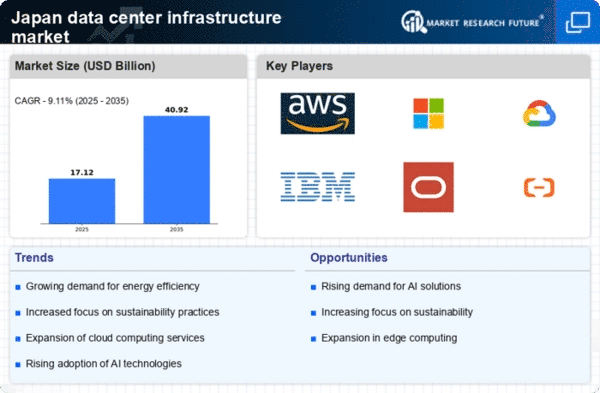Increased Focus on Data Security
Data security concerns are paramount in the data center-infrastructure market in Japan. With the rise in cyber threats and data breaches, organizations are prioritizing the implementation of robust security measures within their data centers. This heightened focus on security is driving investments in advanced infrastructure solutions, including firewalls, intrusion detection systems, and encryption technologies. In 2025, it is anticipated that spending on data security infrastructure will constitute approximately 30% of total data center investments. As regulatory requirements become more stringent, the demand for secure data center environments is likely to escalate, compelling operators to enhance their security protocols and infrastructure capabilities.
Rising Demand for Cloud Services
The increasing reliance on cloud computing solutions is a pivotal driver for the data center-infrastructure market in Japan. As businesses transition to cloud-based operations, the demand for robust data center infrastructure intensifies. In 2025, the cloud services market in Japan is projected to reach approximately $20 billion, reflecting a growth rate of around 15% annually. This surge necessitates enhanced data center capabilities to support scalable and flexible cloud environments. Consequently, data center operators are compelled to invest in advanced infrastructure, including high-capacity servers and efficient cooling systems, to meet the evolving needs of cloud service providers. The interplay between cloud adoption and data center infrastructure development is likely to shape the market landscape significantly.
Growth of Internet of Things (IoT)
The proliferation of Internet of Things (IoT) devices is significantly influencing the data center-infrastructure market in Japan. As more devices become interconnected, the volume of data generated is surging, necessitating enhanced data processing and storage capabilities. By 2025, the number of IoT devices in Japan is expected to exceed 1 billion, leading to an increased demand for data center infrastructure that can handle vast amounts of data efficiently. This trend compels data center operators to invest in scalable solutions that can accommodate the growing data traffic and ensure seamless connectivity. The integration of IoT with data center infrastructure is likely to drive innovation and reshape operational strategies within the market.
Shift Towards Hybrid IT Environments
The transition towards hybrid IT environments is a notable driver for the data center-infrastructure market in Japan. Organizations are increasingly adopting a mix of on-premises and cloud-based solutions to optimize their IT operations. This shift necessitates the development of flexible and scalable data center infrastructure that can seamlessly integrate with various IT environments. In 2025, it is projected that hybrid IT solutions will account for over 40% of total IT spending in Japan. As businesses seek to enhance agility and reduce costs, the demand for data center infrastructure that supports hybrid models is likely to grow, influencing investment strategies and operational frameworks within the market.
Technological Advancements in Infrastructure
Technological innovation plays a crucial role in shaping the data center-infrastructure market in Japan. The advent of advanced technologies such as artificial intelligence (AI), machine learning, and automation is driving the need for more sophisticated data center solutions. These technologies enable improved operational efficiency, predictive maintenance, and enhanced security measures. In 2025, it is estimated that investments in AI-driven data center technologies could account for up to 25% of total infrastructure spending. As organizations seek to optimize their data management processes, the integration of cutting-edge technologies into data center infrastructure becomes increasingly essential, fostering a competitive edge in the market.
















